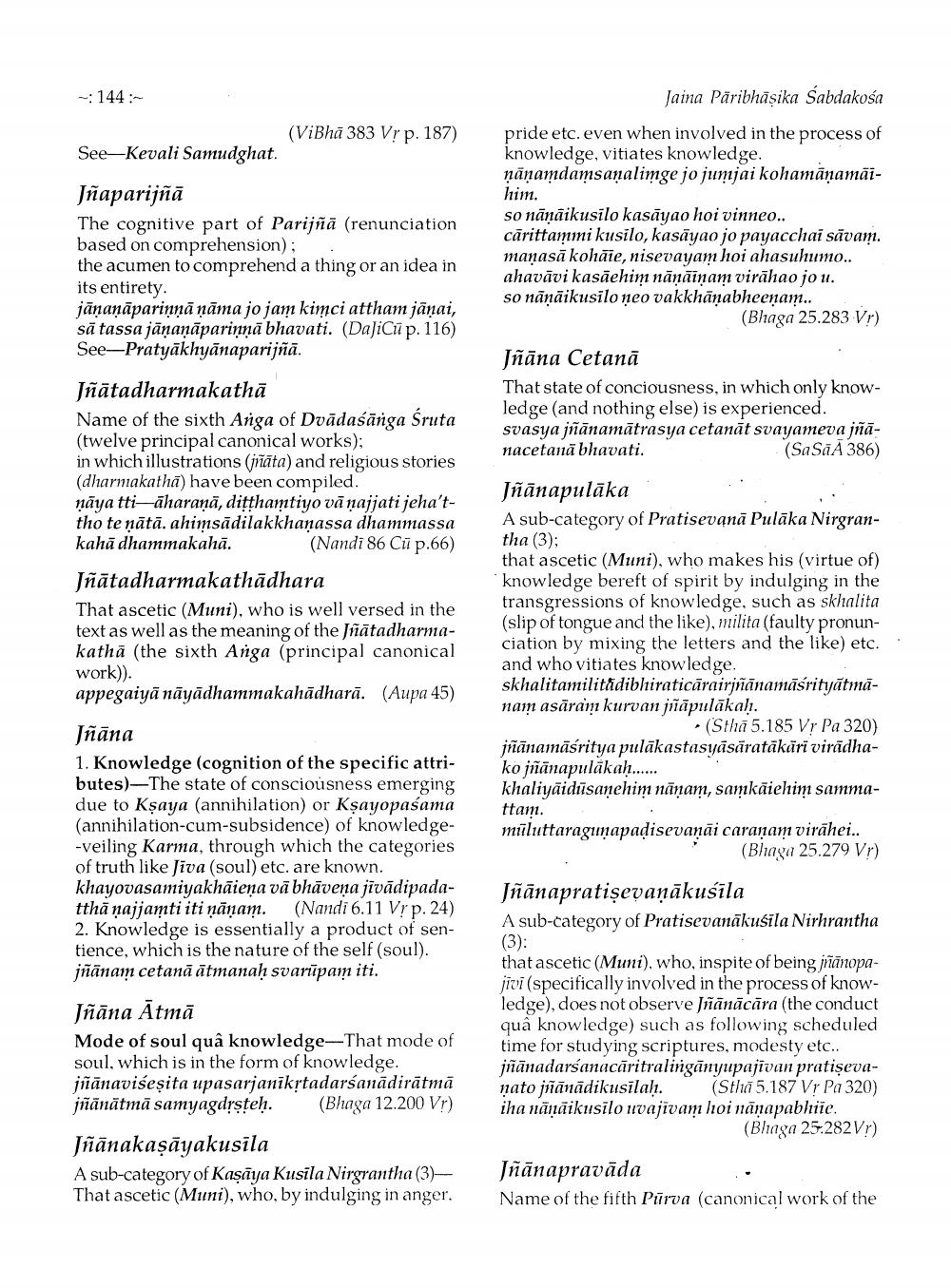________________
144:
Jaina Päribhāsika Sabdakośa
(ViBhā 383 Vr p. 187) See-Kevali Samudghat.
Jñaparijñā The cognitive part of Parijñā (renunciation based on comprehension); . the acumen to comprehend a thing or an idea in its entirety. jāņaņāparinnā ņāma jo jam kimci attham jānai, sā tassa jāņaņāparinnā bhavati. (DaliCū p. 116) See-Pratyākhyānaparijñā.
pride etc. even when involved in the process of knowledge, vitiates knowledge. ņāņamdamsaņalimge jo jumjai kohamāṇamāihim. so nāņāikusilo kasāyao hoi vinneo.. cārittammi kusilo, kasāyao jo payacchai sāvam. maņasā kohāie, nisevayam hoi ahasuhumo.. ahavāvi kasāehim nāņāiņam virāhao jou. so nāņāikusilo neo vakkhāṇabheenam..
(Bhaga 25.283 Vr)
Jñātadharmakathā Name of the sixth Anga of Dvādasānga Sruta (twelve principal canonical works); in which illustrations (rāta) and religious stories (dharmakathā) have been compiled. ņāya tti—āharaṇā, ditthamtiyo vā najjati jeha'ttho te nātā. ahimsādilakkhaṇassa dhammassa kahā dhammakahā. (Nandi 86 Cū p.66)
Jñātadharmakathādhara That ascetic (Muni), who is well versed in the text as well as the meaning of the Jnātadharmakathā (the sixth Arga (principal canonical work)). appegaiyā nāyādhammakahādharā. (Aupa 45)
Jĩãna Cetana That state of conciousness, in which only knowledge (and nothing else) is experienced. svasya jñānamātrasya cetanāt svayameva jñānacetanā bhavati.
(SaSA 386) Jñānapulāka A sub-category of Pratisevanā Pulāka Nirgrantha (3); that ascetic (Muni), who makes his (virtue of) knowledge bereft of spirit by indulging in the transgressions of knowledge, such as skhalita (slip of tongue and the like), milita (faulty pronunciation by mixing the letters and the like) etc.. and who vitiates knowledge. skhalitamilitêdibhiraticārairjñānamāsrityātmānam asāram kurvan jñāpulāka).
(Sthā5.185 V? Pa 320) jñānamäsritya pulākastasijāsāratäkäri viradhako jñānapulākah... khaliyāidūsanehim nānam, samkāiehim sammattam. muluttaragınapadisevaņāi caraṇam virähei..
(Bhaga 25.279 Vr)
Jñāna 1. Knowledge (cognition of the specific attributes)-The state of consciousness emerging due to Kşaya (annihilation) or Kşayopasama (annihilation-cum-subsidence) of knowledge-veiling Karma, through which the categories of truth like Jiva (soul) etc. are known. khayovasamiyakhāieņa vābhāvena jīvādipadatthā najjamti iti ņānam. (Nandi 6.11 Vr p. 24) 2. Knowledge is essentially a product of sentience, which is the nature of the self (soul). jñānam cetanā ātmanaḥ svarūpam iti.
Jñāna Ātmā Mode of soul quâ knowledge-That mode of soul, which is in the form of knowledge. jñānaviseșita upasarjanikrtadarśanādirātmā jñānātmā samyagdrsteh. (Bhaga 12.200 Vr)
Jñānapratișevaņākuśīla A sub-category of Pratisevanākusila Nirhrantha (3): that ascetic (Muni), who, inspite of being jñānopajivi (specifically involved in the process of knowledge), does not observe Jrānācāra (the conduct quâ knowledge) such as following scheduled time for studying scriptures, modesty etc.. jñānadarśanachritralirgānuupajīvan pratişevanato jñānādikusilah. (Sthă5.187 Vr Pa 320) iha nāņāikusilo uvajivam loi nānapabhije.
(Bhaga 25.282Vr)
Jñānakasāyakusila A sub-category of Kaşaya Kusila Nirgrantha (3) That ascetic (Muni), who, by indulging in anger.
Jñānapravāda Name of the fifth Pūrva (canonical work of the




